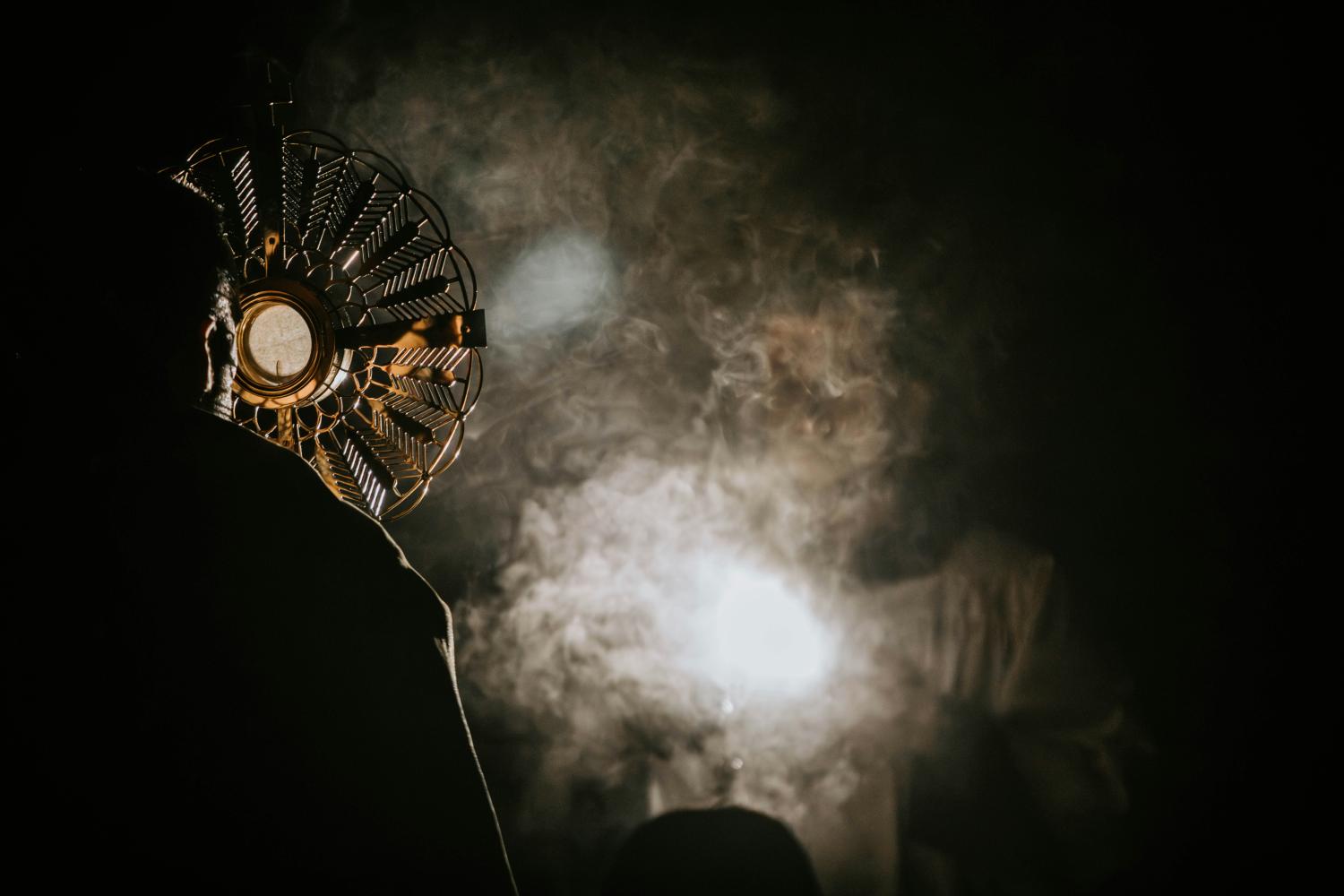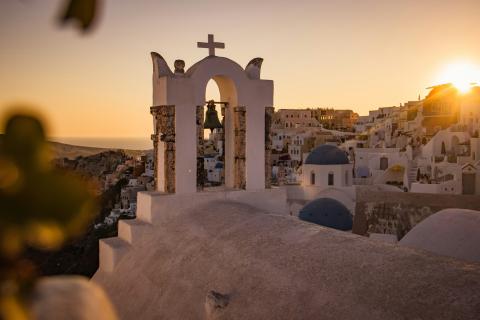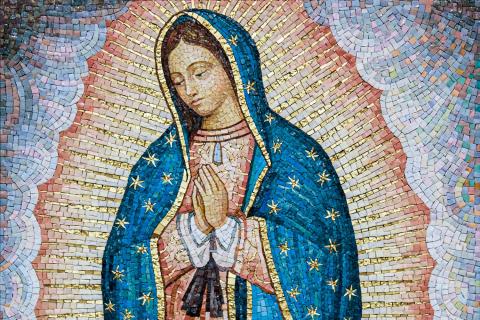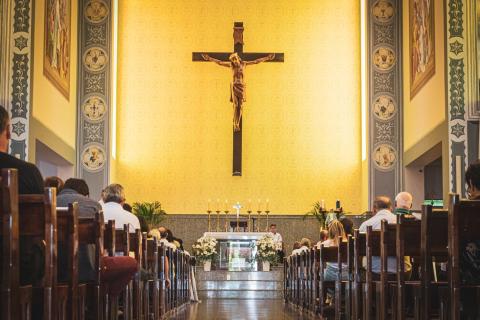
This past July, I was blessed to attend the National Eucharistic Congress in Indianapolis, Indiana. Over 55,000 people from across the country participated in this event, a high point of the National Eucharistic Revival. This three-year initiative, sponsored by the United States Conference of Catholic Bishops, began in 2022 with the aim of reinvigorating devotion and belief in the Real Presence of Jesus in the Eucharist among Catholics.
The numbers say it all: A 2019 Pew Study revealed that only about 30% of Catholics believe in the Eucharistic presence of Jesus—that our Lord is fully present—Body, Blood, Soul, and Divinity—in the Eucharist.1 This past April, Pew released another study revealing that only 28% of U.S. Catholics reported attending Mass weekly or more.2 A recent Gallup poll revealed a similar result with only 21% of U.S. Catholics reporting that they attended Mass weekly, and 9% reporting attending Mass “almost every week.”3 If the Eucharist is truly the “source and summit” of our Catholic faith, then clearly these numbers show that we need “revival in the
land.”
As the National Eucharistic Congress’s website says, “Revival is not something we do. It’s God stirring up the hearts of His People.” From opening ceremony on Wednesday evening, all the way through to the closing liturgy on Sunday morning, participants had the opportunities to worship in reverent liturgies, attend “Impact Sessions” tailored their mission and state in life, attend small Breakout Sessions that addressed topics on all aspects of faith, and the hear some of the most dynamic voices in the Church in the United States speak about our Eucharistic Lord at the evening “Revival Sessions.” During the Thursday Revival session, Fr. Mike Schmitz challenged us to ask God what He wants for us in our lives. During adoration, I felt God stir heart and I heard the word I had long cringed at—“lead.”
My natural introversion and the connected desire of avoiding the spotlight have always been at odds with God’s call to leadership roles. However, over the years I have come to recognise that God has given me particular gifts and talents specifically for this calling. Yet, doubts still arise, especially in moments when I feel that these gifts and talents are undervalued or overlooked by others. Kneeling in the silence of Lucas Oil Stadium surrounded by thousands, the word “lead” resonated in my heart once again. “Ok, but how?”
Over the next few days, I began to encounter people from my past, moments that felt divinely orchestrated amidst 55,000 attendees—a chaperon who travelled to World Youth Day in Denver back in 1993, someone who served with me in Catholic campus ministry while in college, and a handful of guys who I served with when we all worked as parish youth ministers around the Archdiocese of Galveston-Houston. All these encounters brought me back to an extremely formative time in my faith life, especially in regard to my relationship with the Eucharist.
As a cradle Catholic, the Eucharist has always been a part of my faith life, but my devotion deepened in a very real way in the 90s through my involvement with Youth 2000. This Eucharistic retreat movement, founded in England in 1990, was a response to St. Pope John Paul the Great’s call at World Youth Day 1989 in Spain. He proclaimed, “The new discovery of Christ—when it is authentic—always directly results in the desire to bring Him to others, that is, in a commitment to the apostolate. It is not enough to discover Christ—you must bring Him to others!”
Youth 2000 retreats were designed for teenagers and young adults, usually in a school gym or other large meeting space that would be converted into a makeshift chapel for the weekend. The weekend-long event began with a Mass on Friday, which led to the exposition of the Blessed Sacrament, on top of a pyramid-shaped altar, covered with candles, fondly referred to as the “burning bush.” Throughout the weekend’s events there was one constant—the presence of the Eucharistic Lord in the centre of the room. There were moments of praise, moments of silence, and there were inspiring talks given by clergy, religious sisters, and laypeople, each humbly approaching the altar asking the Lord’s permission to speak. Priests were constantly available for confession, and retreat team leaders were available for prayer support. There were moments that participants could meet in small discussion groups in order to ask questions, share how the Lord was moving in their lives, or simply listen to others.
However, it was the Saturday evening Eucharistic Procession that was my favourite part of the retreat. After dinner everyone gathered around the “burning bush” for the evening session. The theme always focused on the healing power of Jesus and the importance of reaching out to Him in faith, exemplified by the story of the haemorrhaging woman who was healed by believing and by simply reaching out and touching the hem of Jesus’ garments. We were told that the same Jesus whose garments were touched then was the same Jesus present with us in the Eucharist—and he would soon be walking amongst us.
To prepare of the procession, the participants, already sitting in concentric rings around the “burning bush,” slightly shifted, creating a spiral path. As the Eucharistic Procession moved from the “burning bush” the priest holding the monstrance paused briefly in front of each participant, allowing them to touch the hem of the humeral veil. The first time I participated in this procession I had a profound encounter with the Eucharistic Lord.
After that first retreat I became more intentionally involved in my parish and took my relationship with Jesus more seriously. As time progressed, much to my chagrin, I began to hear God calling me to positions of leadership. My introversion always kept me back from positions that would draw too much attention, but I recognised that being called by God sometimes meant finding yourself in uncomfortable positions.
When I returned to the Youth 2000 retreat the following year, I was asked to lead a small group, which I accepted having grown in confidence through my work in parish youth ministry. A few hours before the Saturday evening session, I was asked if I would be one of the altar servers for the procession. Excitedly I accepted the opportunity. During the procession, I was given a candle and placed at the front of the procession, slowly leading the procession through the room. As we started I became disappointed, recognising that this was not going to be the same experience that I had had the year before. At the front of the procession I could not see what was happening behind me.
I had all but forgotten this moment from over 30 years ago—until the Friday evening Revival Session at the National Eucharistic Congress.
After keynote addresses by Sr. Josephine Garrett and Fr. Boniface Hicks, there was a Eucharistic Procession around the floor level of Lucas Oil Stadium. Seated in the stands, I gazed down at the procession from a higher vantage point. While the monstrance was processed through the room, I found my vision being drawn to the front of the procession, where there was a single server. Again, I heard the word—“lead”—and the moment from 30 years ago flooded back to my mind.
Suddenly I was back in that makeshift adoration chapel leading the Eucharistic Procession at my second Youth 2000 Retreat: the sound of praise and worship music filled the room, the light of the burning candle flickered in front of me. The dimly lit space ahead appeared before me, and the shadowy figures of the adorers on each side turned their attention on the Eucharistic Lord behind me. I was a light bearer, but I was not the important one. My presence was silently heralding the coming Lord. I was preparing the way of the Lord. “Lead” resonated in my heart again.
The last few weeks I have been reliving this moment from over 30 years ago, reflecting on the calling of leadership, and wondering how I can translate my role as the lead altar server, the light bearer, in a Eucharistic Procession to all areas where I hear God calling me to lead: most significantly in my role as a husband and a father.
As I reflect on my own experiences and the lessons learned, I’ve come to recognise several key traits that define the type of leader I believe we are called to be:
- Humility and Service: Lead others to Christ by focusing on their needs, not on oneself.
- Obedience and Faithfulness: Listen and respond to God’s call, remaining rooted in faith, especially in the Eucharist.
- Guidance and Encouragement: Use your gifts to illuminate the path to Christ for others, empowering them to continue the mission.
- Self-Reflection: Regularly evaluate and realign your actions with God’s will to ensure you remain on the right path.
We all know the lyrics of the famous African American spiritual: “This little light of mine, I’m gonna let it shine!” The light symbolises faith, the divine presence within, and our God-given gifts and talents. Some lights shine brightly, others constant, some draw more attention than others. As St. Pope John Paul the Great said in 1989, if we have had an authentic encounter with Christ, “you must bring Him to others.”5 Those of us who have encountered Jesus are light bearers, called to preparing the way for others to encounter the Lord.
But we must be wary of becoming like the infamous light bearer in the Bible. Lucifer, a name often translated as "light bearer," sought to make his own light the focus rather than directing others to the true Light. As St. Augustine notes in The City of God, pride is the origin and head of evil. It distorts—making us want to claim the glory for ourselves, while shifting the blame of our sin on to others. True leadership is about preparing the way for others to encounter the Lord, serving with humility and faith, and ensuring that our light always points back to Him.
Today, reflecting on the experiences from the National Eucharistic Congress and those from over 30 years ago, I see how leadership in faith is not about being in the spotlight, but about guiding others toward the true Light—Christ Himself. The real test of leadership is whether our actions help others encounter the Lord. It requires humility, a heart of service, and a willingness to step back so that Christ can step forward. Leadership rooted in faith is not about us. It’s about being light bearers, illuminating the path so others can find their way to Him.
As I ponder this, I’m reminded of the challenges we face: Are we leading others to Christ, or simply drawing attention to ourselves? When our time comes to pass on the light, will there be others ready to continue the journey? True leadership means preparing others to take up the mission, serving with humility and always pointing back to Christ. Let’s strive to lead in a way that ensures the flame of faith is passed on, so that even when our own light fades, the light of Christ continues to shine through those we’ve guided.


